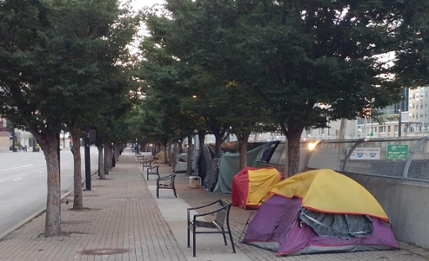ENGL 115: Rhetoric Honors

Photo Credit: Bill Rinehart / WVXU
Faculty: Jeffrey Gerding, Ph.D.
Partners: Northeast Ohio Coalition for the Homeless, Greater Cincinnati Homeless Coalition
As a graduate student at Purdue, Jeff Gerding had his first formative experience with service learning. Once he arrived at Xavier, he was interested in turning a class into a community-engaged course and participated in the Eigel Center’s Academy for Community Engaged Faculty. This spring students in Gerding’s Honor’s Rhetoric (ENGL-115) were able to experience firsthand the fruits of his initial efforts.
Collaborating with Fr. Nathan Wendt, SJ, of the Eigel Center, Gerding was able to integrate Covid-safe immersive and community engaged experiences into his course including a class walkabout in the West End and Over the Rhine led by the Greater Cincinnati Homeless Coalition, a resource mapping exercise, and a panel featuring community voices. Because of the pandemic, Gerding and Wendt were able to engage partners virtually like the Northeast Ohio Coalition for the Homeless (NEOCH), a nonprofit organization located in Cleveland, Ohio, that organizes and empowers homeless at-risk men, women and children to break the cycle of poverty through public education, advocacy and the creation of nurturing environments. Gerding’s students connected with NEOCH virtually throughout the semester via facilitated reflection sessions, and participation in interactive exercises designed in advance to meet course outcomes.
One of these facilitated experiences included a resource mapping exercise that put students in the shoes of a person experiencing homelessness. Gerding notes that people in crisis are expected to navigate a complex network of resources, agencies, and programs, often without support or reliable transportation. By completing this challenge, he hopes his students can build empathy for people experiencing housing insecurity.
“I think one of the things about an immersion that I find to be so rewarding is this idea of students experiencing conditions beyond their own sort of experience. I think the idea of an immersive learning experience is that it's pushing us to engage in different ways than then what we're maybe used to or comfortable with.”
Ryan Zimmerman, a sophomore Biomedical Sciences major in Gerding’s class agrees:
“The scavenger hunt allowed us to walk in the shoes of the homeless and get a feel of how spread out resources are. These immersive experiences allow us to get a real life feel of the material and to take our own direct experiences and reflect on them.”
In the classroom, Gerding assigned complementary reading and writing prompts that revolved around understanding and acceptance of populations beyond our own, including the homeless. It was his intention that students would be able to analyze the causal relationships that exist in this population and study the needs of the homeless as well as the means to empower them. Ultimately, Gerding aspires for his students to walk away knowing that communication and writing is a direct line to becoming more involved with our community.
One tangible outcome of Gerding’s class is the student-led production of a podcast series about homelessness. Gerding’s class will ultimately take what they learned throughout the semester about rhetoric and homelessness to create episodes that persuade a particular audience to learn more about the issue of homelessness and to compel others to take action. To support their work, students connected with a successful locally based podcast, the West End Stories Project, to learn how to develop an informative and persuasive podcast series that could engage a broad audience while helping listeners understand an issue or subtopic related to homelessness.
In reflecting on his own experiences teaching a course that integrates so many moving parts and partners, Gerding notes,
“Teaching an immersive learning experience, I think, for professors, also requires us to set aside our own expectations and our own desire to kind of control everything and see a specific outcome, because there's multiple people involved. I think the opportunity for students to connect with each other and to still have this enriching experience has been extremely important during COVID when we all feel isolated - when we all feel disconnected from other people, both to build empathy with other citizens, and also to develop, closer relationships with each other that we just haven't been able to do in online or fully remote or hybrid courses.”